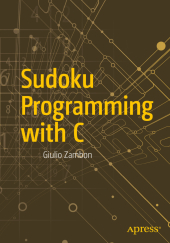 Neuerscheinungen 2015Stand: 2020-02-01 |
Schnellsuche
ISBN/Stichwort/Autor
|
Herderstraße 10
10625 Berlin
Tel.: 030 315 714 16
Fax 030 315 714 14
info@buchspektrum.de |

Giulio Zambon
Sudoku Programming with C
2015. xiv, 300 S. 90 SW-Abb. 254 mm
Verlag/Jahr: SPRINGER, BERLIN; APRESS 2015
ISBN: 1-484-20996-6 (1484209966)
Neue ISBN: 978-1-484-20996-7 (9781484209967)
Preis und Lieferzeit: Bitte klicken
Sudoku Programming with C teaches you how to write computer programs to solve and generate Sudoku puzzles. This is a practical book that will provide you with everything you need to write your own books of Sudoku Classic and Samurai puzzles. But be warned: after reading it, you´ll discover that the puzzles in your local paper are not so challenging after all!
We like Sudokus because they test our capacity to recognize and interpret patterns. But how are the clues generated? Where do those quasi-symmetrical configurations come from? When the author explored the Web to find out, he discovered that there were many sites that explained how to solve Sudokus, but none that told him how create them. He also saw many sites and apps to play Sudoku, but, perhaps not surprising, no indication of how they worked.
So, he had to develop his own applications in order to find out. And, from the very start, he decided that he would publish the code for anyone else to use and perhaps tinker with, but the author wrote it in such a way that also lets readers with limited knowledge of programming techniques understand it. In fact, you could decide to start generating thousands of puzzles almost immediately, and go through the explanations of algorithms and techniques later, a bit at a time. The author chose to write the application in ´plain old C´ because he wanted to make the code accessible to as many people as possible.
In this book, you will find an explanation of all solving strategies, and the code to implement them. Writing the Solver application was more difficult than writing the Generator, because it required designing and implementing each strategy separately. However, the author wanted to include a solving program capable of listing the strategies necessary to solve any particular puzzle. He also wanted to check whether a puzzle was solvable analytically, without any guessing.
This book includes the full listings of both the Generator and the Solver, and explanations of all C modules, with walk-throughs and examples.
1. Modelling a Sudoku Puzzle in C
2. The Strategies
3. Main Program and Utilities
4. Implementing ´unique´
5. Implementing ´naked´ Strategies
6. Implementing ´hidden´ Strategies
7. Implementing ´box-line´
8. Implementing ´pointing-line´
9. Implementing ´lines´ Strategies
10. Implementing ´Y-wing´
11. Implementing ´XY-chain´
12. Implementing ´rectangle´
13. Implementing ´backtrack´
14. Solving Thousands of Puzzles
15. Generating Sudokus
16. Puzzle Statistics
17. Puzzles
18. Samurai Sudokus
A. Eclipse CDT
B. Puzzle Solutions
C. Abbreviations and Acronyms
D. Strategy Index
Giulio Zambon s first love was physics, but he decided to dedicate himself to software development more than 30 years ago: back when computers were still made of transistors and core memories, programs were punched on cards, and Fortran only had arithmetic IFs. Over the years, he learned a dozen computer languages and worked with all sorts of operating systems. His specific interests were in telecom and real-time systems, and he managed several projects to their successful completion. In 2001 Giulio founded his own company offering computer telephony integration (CTI) services, and he used JSP and Tomcat exclusively to develop the web side of the service platform. Back in Australia after many years in Europe, he now dedicates himself to writing software to generate and solve numeric puzzles. His web site, http://zambon.com.au/, is written in JSP on his dedicated server, which, unsurprisingly, runs Tomcat!


